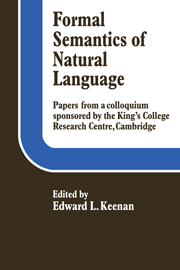Book contents
- Frontmatter
- Contents
- Notes on the contributors
- Acknowledgements
- Introduction
- I QUANTIFICATION IN NATURAL LANGUAGE
- Adverbs of quantification
- Deletion and variable binding
- A semantics for superficial and embedded questions in natural language
- Sortal quantification
- II REFERENCE AND CROSS REFERENCE
- III INTENSIONAL LOGIC AND SYNTACTIC THEORY
- IV QUESTIONING MODEL THEORETIC SEMANTICS
- V PRAGMATICS AND SENTENCES IN CONTEXT
- VI SEMANTICS AND SURFACE SYNTAX
Sortal quantification
Published online by Cambridge University Press: 05 November 2011
- Frontmatter
- Contents
- Notes on the contributors
- Acknowledgements
- Introduction
- I QUANTIFICATION IN NATURAL LANGUAGE
- Adverbs of quantification
- Deletion and variable binding
- A semantics for superficial and embedded questions in natural language
- Sortal quantification
- II REFERENCE AND CROSS REFERENCE
- III INTENSIONAL LOGIC AND SYNTACTIC THEORY
- IV QUESTIONING MODEL THEORETIC SEMANTICS
- V PRAGMATICS AND SENTENCES IN CONTEXT
- VI SEMANTICS AND SURFACE SYNTAX
Summary
This paper falls into two parts, the first by Altham, the second by Tennant. The second part contains the formal work; it sets forth a syntactic system for representing sortally quantified sentences of English, and provides semantics for the sentences so represented. Illustrations of the usefulness of the ideas presented are drawn from among the trickier kinds of sentences that have appeared in the literature. The first part gives some indication of the background to some of the ideas in the second part. It also shows the range of expressions that have some claim to treatment by the methods that follow.
Part I
The standard logical quantifiers of classical predicate logic, (∃x), and (∀x) – the existential and universal quantifiers respectively – are familiar, as is also the idea that their workings in the system which is their home may serve as a source of syntactical and semantic insights into a class of English sentences containing such words as some, none, every, and any. The best known example of the use of this idea is perhaps the use of the logician's notion of the scope of a quantifier to explain why it is that in some contexts any may be replaced by every without change of truth value, whereas in other contexts the substitution must be made with some.
- Type
- Chapter
- Information
- Formal Semantics of Natural Language , pp. 46 - 58Publisher: Cambridge University PressPrint publication year: 1975
- 6
- Cited by

